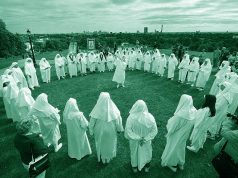Two men stood next to one another on the crowded subway platform in New York City. It was rush hour.

The train came to a stop and the doors flew open. As the men stepped forward to enter, a man who had become nauseous on the crowded, swaying train lost it, and soiled one of the two men.
The doors slammed shut. The train sped off into the night with its red rear lights disappearing into the darkness. The two shocked men remained standing on the platform. Said the one who had been the recipient of the unexpected eruption, “Why me?”
That’s the spirit reflected in Psalm 44, a troubling prayer of accusation against God himself.
Glorious Past
It begins with a remembrance of what “our fathers have told us”—namely, that the planting of Israel in the land resulted from God’s efforts and not theirs (vv. 1–3). An underlying complaint within the psalm is that God’s activity in our lives does not seem evenly placed. He appears to have moments of intersection with us when His activity bursts forth in plenty, followed by long periods when nothing seems to be happening.




